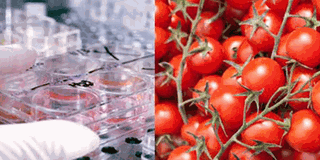Grow bio-tech crops to earn more - scientists

Biotechnology is the use of biological processes, organisms, or systems to manufacture products intended to improve the quality of human life. The earliest biotechnologists were farmers who developed improved species of plants and animals by applying cross breeding from the genes. The global yield rate of biotech crops for all countries is rated at 74 per cent with developed countries taking an upper hand of 59 percent.
What you need to know:
Modified crop varieties. Crop scientists suggest that farmers grow more modified crops to satisfy global markets.
Ugandan farmers should grow improved crop varieties if they are to reap from their produce and meet the growing demand on the local and international markets.
Currently, most farmers are growing the conventional traditional varieties of maize, banana, beans, cassava and rice among others which are prone to climate change effects such as drought, floods, and pest and diseases. This, scientists say, contributes to farmers harvesting low yields, creating shortage in the supply of food to meet the overwhelming demand.
Statistics from Peer Review Survey of 2010 on the positive impact of genetically modified crops indicate that only 12 per cent of rural household farmers in Uganda are significant food sellers in both the national and regional markets compared to the 66 per cent buyers.
In other words, the number of food sellers in Uganda has been rated low compared to the buyers because most Ugandan farmers are growing traditional varieties for home consumption rather than for commercial purposes.
A senior crop science researcher at the National Crop Resources Research Institute Namulonge, Yona Baguma, advises Ugandan farmers to venture into using improved high breed seeds for more profits.
Crops scientists have been working on improved varieties for cassava, maize, rice, beans, ground nuts and bananas among others which according to Dr Baguma, should be adopted by farmers if they want to commercialise agriculture.
Executive Director of Uganda Export Promotion, Florence Kata equally expresses the growing demand for Uganda’s produce although it brings in less food. “There is very high demand for Uganda’s food produce but farmers are using old traditional seeds which end up producing low yields,” Ms Kata says adding that this leads to excess demand for food with low supply.
“There is great opportunity for farmers to adapt improved seeds, practice good farm management and better post harvest methods if they want to obtain high yields to capture both regional and national market,” she said
Since there is a global problem of food shortage, Ugandan farmers should embrace new technologies to avoid lagging behind.
Globally, since 1996 to 2009, the economic and environment value of biotech crops has been rated as contributing to sustainability and climate change by increasing crop production to the tune of $65 billion.
According to Dr Baguma, if farmers in Uganda ventured into growing improved variety crops, this will create jobs to the people through industrial development in the agricultural sector as well as improve nutrition. Statistics from the same source indicate that agriculture accounts for 40 per cent Gross Domestic Product, and generates 85 per cent export earnings.
“Over 85 per cent of Ugandans live in rural areas meaning all their engagement is all about agriculture. This therefore calls for improved methods of cultivation as well as use of improved crop varieties to meet required labour market and demand for the agricultural products in the growing market,” Dr Baguma said.
The projection in the population growth indicates that by 2050, the population of Uganda will be 105 million from the current 31 million and 30 per cent of the current population are children below the age of 15 who will need employment in the next five years.
Dr Baguma says that the average caloric intake by the people of Uganda is 1,900kcal (Kilo calorie) below the recommended 2,300 kcal by World Health Organisation.
The statistics further show that 35 per cent of Ugandan children are stunted and another 30 per cent of women are iron deficient. Furthermore, 28 per cent of the children and 52 per cent of women are Vitamin A deficient. This, he said, calls for adaptation of improved varieties where scientists are working on nutritional food contents such as Iron and Vitamin rich banana.
The global value of biotech seeds for the year 2010 has been valued at $11.2 billion with commercial biotech maize, soya beans, grain and cotton valued at $150 billion per year.
But for Uganda, future prospects that are being encouraged for the next five years is adaptation of drought tolerant maize, golden rice and BT cotton that is set to benefit 1 billion rural farmers.




